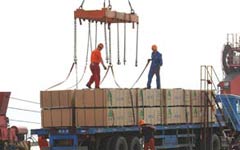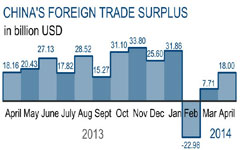Successful companies have shifted to added-value sectors to weather a stormy foreign trade market, reports Wei Tian in Shanghai
Chinese exporters are sailing into head-winds of sluggish demand overseas and rising costs for domestic manufacturers.
According to data released by the General Administration of Customs on Thursday, China's exports dropped by 1.2 percent to 6.5 trillion yuan ($1.04 trillion) in the first half of the year, with the trade surplus declining by 6.5 percent to 630.6 billion yuan. If calculated in dollars, the exports registered a slight increase of 0.9 percent in the first six months.
|
 |
 |
Jiangsu province's exports increased by 4.9 percent year-on-year in the first five months, are markable result compared with most other exporters in the country, which had to rely on new orders from the United States and Europe amid their weak recovery.
Jiangsu has come up with 21 measures to support foreign trade, focusing on generating business orders through financial and fiscal incentives.
Sound growth figures also were reported in the Yangtze River Delta region - especially in Shanghai and Zhejiang province.
Shanghai's foreign trade grew by 14.7 percent year-on-year in April, nine percentage points higher than the previous month.
Zhejiang also reported double-digit growth for its exports for March and April.
Foreign trade volume for the Yangtze River Delta region accounted for one-third of the nation's total, thus stabilizing growth in the region is essential to the entire country, said Ning Yuemin, director of the Institute of Urban and Regional Planning at East China Normal University.
In Shanghai, traditional labor-intensive industries are still facing difficulties, as exporters of textiles, furniture, plastic products, suitcases, footwear, lighting and toys saw revenue from overseas markets decline by 1.4 percent in the first quarter.
But high-tech exports fared better, driving up overall growth.
